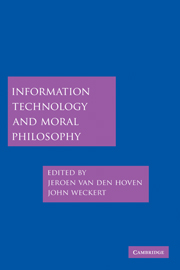Book contents
- Frontmatter
- Contents
- List of Contributors
- Introduction
- 1 Norbert Wiener and the Rise of Information Ethics
- 2 Why We Need Better Ethics for Emerging Technologies
- 3 Information Ethics: Its Nature and Scope
- 4 The Transformation of the Public Sphere: Political Authority, Communicative Freedom, and Internet Publics
- 5 Democracy and the Internet
- 6 The Social Epistemology of Blogging
- 7 Plural Selves and Relational Identity: Intimacy and Privacy Online
- 8 Identity and Information Technology
- 9 Trust, Reliance, and the Internet
- 10 Esteem, Identifiability, and the Internet
- 11 Culture and Global Networks: Hope for a Global Ethics?
- 12 Collective Responsibility and Information and Communication Technology
- 13 Computers as Surrogate Agents
- 14 Moral Philosophy, Information Technology, and Copyright: The Grokster Case
- 15 Information Technology, Privacy, and the Protection of Personal Data
- 16 Embodying Values in Technology: Theory and Practice
- 17 Information Technology Research Ethics
- 18 Distributive Justice and the Value of Information: A (Broadly) Rawlsian Approach
- Select Bibliography
- Index
- References
3 - Information Ethics: Its Nature and Scope
Published online by Cambridge University Press: 21 July 2009
- Frontmatter
- Contents
- List of Contributors
- Introduction
- 1 Norbert Wiener and the Rise of Information Ethics
- 2 Why We Need Better Ethics for Emerging Technologies
- 3 Information Ethics: Its Nature and Scope
- 4 The Transformation of the Public Sphere: Political Authority, Communicative Freedom, and Internet Publics
- 5 Democracy and the Internet
- 6 The Social Epistemology of Blogging
- 7 Plural Selves and Relational Identity: Intimacy and Privacy Online
- 8 Identity and Information Technology
- 9 Trust, Reliance, and the Internet
- 10 Esteem, Identifiability, and the Internet
- 11 Culture and Global Networks: Hope for a Global Ethics?
- 12 Collective Responsibility and Information and Communication Technology
- 13 Computers as Surrogate Agents
- 14 Moral Philosophy, Information Technology, and Copyright: The Grokster Case
- 15 Information Technology, Privacy, and the Protection of Personal Data
- 16 Embodying Values in Technology: Theory and Practice
- 17 Information Technology Research Ethics
- 18 Distributive Justice and the Value of Information: A (Broadly) Rawlsian Approach
- Select Bibliography
- Index
- References
Summary
The world of the future will be an ever more demanding struggle against the limitations of our intelligence, not a comfortable hammock in which we can lie down to be waited upon by our robot slaves.
(Wiener 1964, p. 69)A UNIFIED APPROACH TO INFORMATION ETHICS
In recent years, information ethics (IE) has come to mean different things to different researchers working in a variety of disciplines, including computer ethics, business ethics, medical ethics, computer science, the philosophy of information, social epistemology, and library and information science. Perhaps this Babel was always going to be inevitable, given the novelty of the field and the multifarious nature of the concept of information itself. It is certainly unfortunate, for it has generated some confusion about the specific nature and scope of IE. The problem, however, is not irremediable, for a unified approach can help to explain and relate the main senses in which IE has been discussed in the literature. The approach is best introduced schematically and by focusing our attention on a moral agent A.
Suppose A is interested in pursuing whatever she considers her best course of action, given her predicament. We shall assume that A's evaluations and actions have some moral value, but no specific value needs to be introduced. Intuitively, A can use some information (information as a resource) to generate some other information (information as a product) and in so doing affect her informational environment (information as target).
- Type
- Chapter
- Information
- Information Technology and Moral Philosophy , pp. 40 - 65Publisher: Cambridge University PressPrint publication year: 2008
References
- 71
- Cited by



